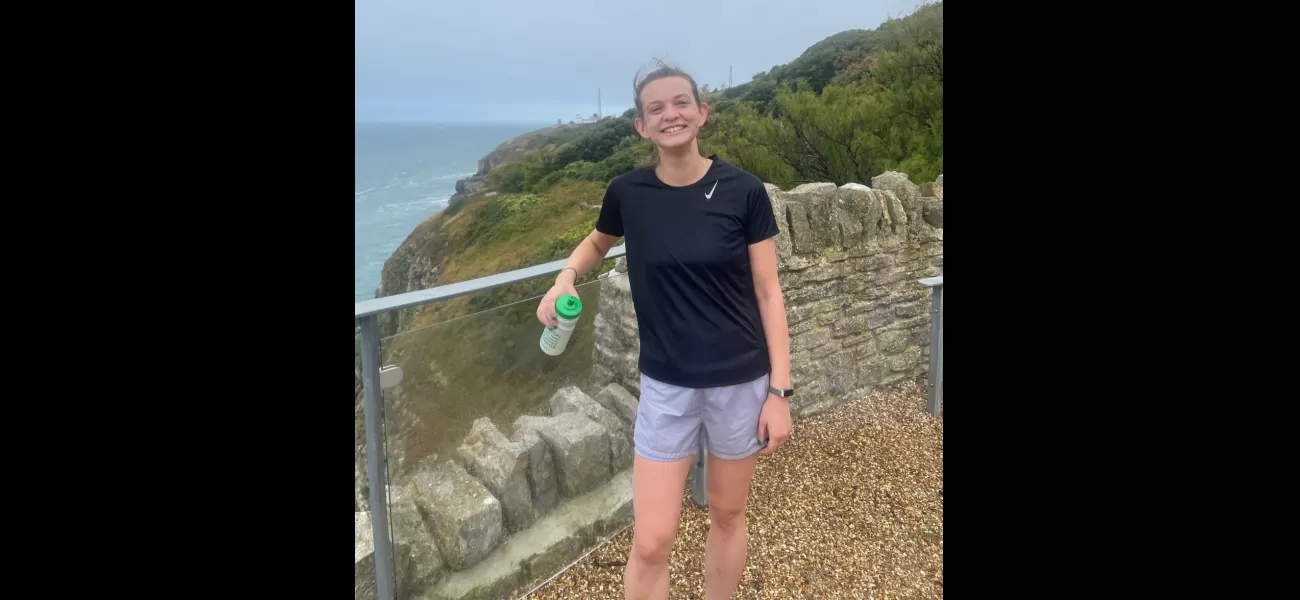This is about female empowerment and standing up for their rights.
I'm part of a team and it feels great.
August 20th 2023.

Nervous anticipation is settling in as England's Lionesses prepare to face off Spain in their first ever Women's World Cup final. It's not just about a chance to secure a World Cup trophy since 1966. It's about so much more than that.
Friends who've traditionally had little interest in the game are now shouting, swearing, cheering and crying at the screen like seasoned, diehard fans. This is about equality. It's about celebrating women's bodies for their power, talent and sporting achievement, rather than what they look like. It's about watching the 'little Lionesses' kitted out in their shirts. It's also a bittersweet reflection on everything we missed out on, and everything they stand to gain.
Metro's own Evelyn Richards, 25, remembers growing up in the noughties and being categorised into one of two groups: girly girls and tomboys. As a 'naturally boisterous' child she identified with the latter and though she 'lived in England football kits' at home, she was still shunned by football-loving boys at school. Despite being obsessed with the World Cup in 2004, she didn't feel embraced as a fan.
Evelyn reflects on the underrepresentation of women in the media and how it impacted her. Without female representation, she started to believe the boys in the playground who said 'girls can't play football'. By junior school she'd hung up her football kit, just as generations of girls have done.
Sport England's Active Lives survey found 2.4 million fewer women than men enjoy sport and physical activity. The Enjoyment Gap matters because enjoyment is one of the primary drivers of activity. 55.2% of boys participated in football in the last week, compared to 22.0% of girls. 43% of girls who felt they were sporty at primary school said they lost interest as teenagers.
Kelly Newton, 52, from Croydon, played in a 5-a-side tournament the Metropolitan Police hosted when she was nine years old. Despite loving the game, opportunities to play as she grew older were non-existent. Sadly, this was the case for Lucy Alphonse, 26 from London, who played in her secondary school girls' football team until it was suddenly cut when she was 14.
Thankfully, times are changing. Charlotte Wilkes, 36 from Thames Ditton, Surrey, is inspired to start playing in her thirties by her nine-year-old daughter, Willow. Willow started playing football at the age of four and has played in a boys' team for three seasons. It's inspiring to see girls and women of all ages playing football and being embraced as fans.
The Women's World Cup final is a testament to the female athletes who've worked hard to make this possible. It's a time to celebrate their success and to close the Enjoyment Gap. As the Lionesses take the pitch today, let's cheer them on and thank them for inspiring generations of girls and women to get involved in football.
Nervous anticipation is settling in across England as the Lionesses prepare to face off Spain in their first ever Women's World Cup final. It's a monumental moment for the nation - not only is it their best chance of securing a World Cup trophy since 1966, but it's also about so much more than just the football.
For many women, this is about equality. It's about seeing female bodies celebrated for their power, talent and sporting achievement, rather than for their looks. It's about watching the 'little Lionesses' kitted out in their shirts, and it's a bittersweet reflection on everything we missed out on, and everything they stand to gain.
Evelyn Richards, 25, from Metro, can still recall the World Cup of 2004 - the first tournament she was old enough to truly appreciate. She remembers the boys of her primary school obsessing over football legends, while she was shoehorned into the 'tomboy' category and didn't feel embraced as a fan.
At six years old, she felt the lack of female representation in the media, which meant she chose a man as her role model for a Year 2 presentation - a man with a long list of scandals. Sadly, by the time she reached junior school she'd hung up her football kit, as generations of girls before her have done.
Sport England's latest Active Lives survey revealed that 2.4 million fewer women than men enjoy sport and physical activity, and the Enjoyment Gap is a major factor in this. The survey found 55.2% of boys participate in football in the last week, compared to 22.0% of girls, and 43% of girls who felt they were sporty at primary school said they lost interest as teenagers.
Kelly Newton, 52, from Croydon, played in a 5-a-side tournament the Metropolitan Police hosted when she was nine years old. Despite her love for the game, there were no opportunities to play as she grew older and it all fizzled out. Similarly, Lucy Alphonse, 26 from London, played in her secondary school girls' football team until it was unexpectedly cut when she was 14.
Thankfully, times are changing. Charlotte Wilkes, 36 from Thames Ditton, Surrey, has been inspired to start playing in her thirties by her nine-year-old daughter, Willow. Willow started playing football at the age of four and while she's had limited opportunities to play in a girls' team, Charlotte is determined to ensure the next generation will have a different experience.
As England's Lionesses take to the field today, let's not forget this moment is about more than just the football. It's about celebrating female bodies for their power and talent, and a huge step towards achieving true equality in sport.
Friends who've traditionally had little interest in the game are now shouting, swearing, cheering and crying at the screen like seasoned, diehard fans. This is about equality. It's about celebrating women's bodies for their power, talent and sporting achievement, rather than what they look like. It's about watching the 'little Lionesses' kitted out in their shirts. It's also a bittersweet reflection on everything we missed out on, and everything they stand to gain.
Metro's own Evelyn Richards, 25, remembers growing up in the noughties and being categorised into one of two groups: girly girls and tomboys. As a 'naturally boisterous' child she identified with the latter and though she 'lived in England football kits' at home, she was still shunned by football-loving boys at school. Despite being obsessed with the World Cup in 2004, she didn't feel embraced as a fan.
Evelyn reflects on the underrepresentation of women in the media and how it impacted her. Without female representation, she started to believe the boys in the playground who said 'girls can't play football'. By junior school she'd hung up her football kit, just as generations of girls have done.
Sport England's Active Lives survey found 2.4 million fewer women than men enjoy sport and physical activity. The Enjoyment Gap matters because enjoyment is one of the primary drivers of activity. 55.2% of boys participated in football in the last week, compared to 22.0% of girls. 43% of girls who felt they were sporty at primary school said they lost interest as teenagers.
Kelly Newton, 52, from Croydon, played in a 5-a-side tournament the Metropolitan Police hosted when she was nine years old. Despite loving the game, opportunities to play as she grew older were non-existent. Sadly, this was the case for Lucy Alphonse, 26 from London, who played in her secondary school girls' football team until it was suddenly cut when she was 14.
Thankfully, times are changing. Charlotte Wilkes, 36 from Thames Ditton, Surrey, is inspired to start playing in her thirties by her nine-year-old daughter, Willow. Willow started playing football at the age of four and has played in a boys' team for three seasons. It's inspiring to see girls and women of all ages playing football and being embraced as fans.
The Women's World Cup final is a testament to the female athletes who've worked hard to make this possible. It's a time to celebrate their success and to close the Enjoyment Gap. As the Lionesses take the pitch today, let's cheer them on and thank them for inspiring generations of girls and women to get involved in football.
Nervous anticipation is settling in across England as the Lionesses prepare to face off Spain in their first ever Women's World Cup final. It's a monumental moment for the nation - not only is it their best chance of securing a World Cup trophy since 1966, but it's also about so much more than just the football.
For many women, this is about equality. It's about seeing female bodies celebrated for their power, talent and sporting achievement, rather than for their looks. It's about watching the 'little Lionesses' kitted out in their shirts, and it's a bittersweet reflection on everything we missed out on, and everything they stand to gain.
Evelyn Richards, 25, from Metro, can still recall the World Cup of 2004 - the first tournament she was old enough to truly appreciate. She remembers the boys of her primary school obsessing over football legends, while she was shoehorned into the 'tomboy' category and didn't feel embraced as a fan.
At six years old, she felt the lack of female representation in the media, which meant she chose a man as her role model for a Year 2 presentation - a man with a long list of scandals. Sadly, by the time she reached junior school she'd hung up her football kit, as generations of girls before her have done.
Sport England's latest Active Lives survey revealed that 2.4 million fewer women than men enjoy sport and physical activity, and the Enjoyment Gap is a major factor in this. The survey found 55.2% of boys participate in football in the last week, compared to 22.0% of girls, and 43% of girls who felt they were sporty at primary school said they lost interest as teenagers.
Kelly Newton, 52, from Croydon, played in a 5-a-side tournament the Metropolitan Police hosted when she was nine years old. Despite her love for the game, there were no opportunities to play as she grew older and it all fizzled out. Similarly, Lucy Alphonse, 26 from London, played in her secondary school girls' football team until it was unexpectedly cut when she was 14.
Thankfully, times are changing. Charlotte Wilkes, 36 from Thames Ditton, Surrey, has been inspired to start playing in her thirties by her nine-year-old daughter, Willow. Willow started playing football at the age of four and while she's had limited opportunities to play in a girls' team, Charlotte is determined to ensure the next generation will have a different experience.
As England's Lionesses take to the field today, let's not forget this moment is about more than just the football. It's about celebrating female bodies for their power and talent, and a huge step towards achieving true equality in sport.
[This article has been trending online recently and has been generated with AI. Your feed is customized.]
[Generative AI is experimental.]
0
0
Submit Comment





